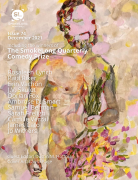“Porcupine” is about a watershed moment in the relationship between two characters formed by a chain of events. As far as the inspiration for the story, did the watershed moment happen initially at the idea of the story or did it build up as you formulated it?
It very much was a story I found along the way as I was writing in terms of the ending and the change of the relationship. I did not go into the story knowing how it would end. Sometimes, I do, but I feel most often when I’m writing I sort of find it along the way. Oftentimes, I feel I have very little insight into my own writing process, but there is a moment where I realize towards the end, “Oh. This is how I want it to end. This is where it’s going.” I definitely built [up] to that [moment] with inspiration. I often start writing with an image in mind. I read On Writing: A Memoir on the Craft by Stephen King and I found it really interesting because he said the way you can start every story is starting with a situation between two characters or however many characters … I thought that was interesting because I feel I never start a story that way. I always start with an image, that’s always where my urge to write comes, description, and that is where this story started for me, with the roadkill.
The theme of nature pops up in the story in the use of visual elements of nature as description and objects. Was the use of nature as a third character in the story intentional?
It [nature] is this omnipresent force in the story. I feel the way I interact with nature or the way I perceive nature is: “It’s so beautiful and it’s so conquered in a lot of places.” It’s why I think roadkill is also really interesting because I feel the overhunting by accident, the death, the completely pointless and unnecessary death of animals that is not for hunting, it’s not for any purpose—we’re accidentally destroying nature all the time—I find it to be very upsetting. I like the idea of the hurricane acting almost as this pushback, getting people out of their homes and having that impact, not necessarily to pit nature against humankind, but like the wane and waft of what nature is and how it interacts with our life as it could be perceived as an intruder or something to trample.
Did the structure of the road trip come first or the story?
It’s pretty much a commute for these two [characters] and their start up business. The structure came not super intentionally at first. I ended up just writing little snatches of writing. It’s a pretty linear story. It goes in order. It’s sequential … it’s something about the commute where you segment it off in your head, at least I do. When I’m driving to work, there’s different landmarks and times during the day or different things that I feel break up the road trip into these different segments. In this story, it’s the different houses. For the most part, it’s the different places they [the characters] have to get to, but it’s also different landmarks and things they see along the drive that break it up. I tried my best to keep it a consistent chunk of text. It’s almost like little micros, little micro experiences that go in sequential order and build into the different experiences these two [characters] have.
The dialogue in the story shows a connection between the two characters, Van Behr and the narrator. They share a humor, but there is also an ongoing conversation with the reader, between the reader and the narrator with the repetitive “suppose” statements. Do you believe the purpose of dialogue in a story is only to move the plot forward?
I agree that dialogue can do so much more. I think it establishes so much about the characters’ backgrounds, where they’re from. The “supposed” statements are nebulous whether or not they’re going to the reader or if they’re internal thoughts that the character is having. What I like about those kind of statements, and I’ve seen them done, not in this exact way, but I appreciated when I’ve read stories that take you out of the story in a controlled way, where you’re still in it, but it tries to prompt some sort of introspection on the behalf of the story in the reader, trying to nudge almost this meta background thought that’s going on and adds context to the story.
What do you like about flash? What draws you to it from a reader’s standpoint or even as a writer of flash?
I’ve been writing flash for a couple of years and it is by far my favorite thing to write without any competition. I write it the most out of anything. What I love about flash is that I think I can move to different ideas quickly in different stories. I can write stories quickly. I feel where I am as the writer right now, it is the form that I feel I have the most control over. If I try to write something longer, not to say that it never turns out well, but I do feel with flash I can keep it all in my head while I’m writing, which I think allows me to really place everything where I would like it to be. I think it’s such a powerful form because it hits so quickly and leaves so much unsaid. This is what they always say about flash, that it leaves so much unsaid. I totally agree. I think that there’s truth to that old saying. I think that it [flash] sticks with you. A good flash story sticks with you for a long time.



 The core workshop of SmokeLong Fitness is all in writing, so you can take part from anywhere at anytime. We are excited about creating a supportive, consistent and structured environment for flash writers to work on their craft in a community. We are thrilled and proud to say that our workshop participants have won, placed, or been listed in every major flash competition. Community works.
The core workshop of SmokeLong Fitness is all in writing, so you can take part from anywhere at anytime. We are excited about creating a supportive, consistent and structured environment for flash writers to work on their craft in a community. We are thrilled and proud to say that our workshop participants have won, placed, or been listed in every major flash competition. Community works.